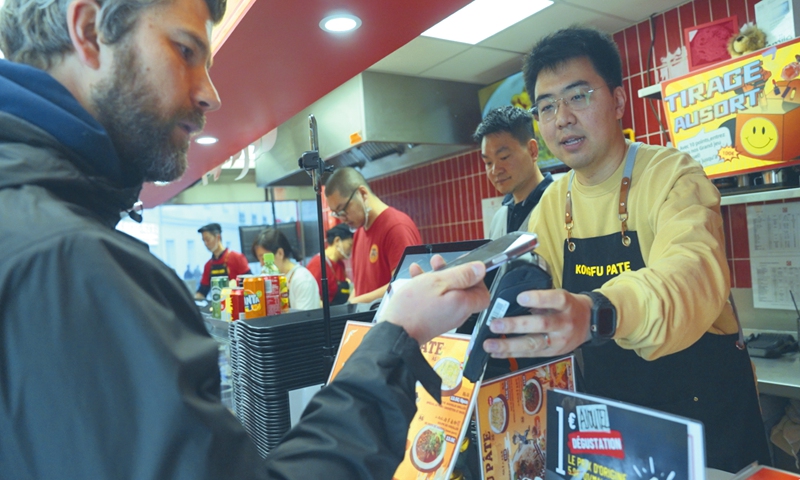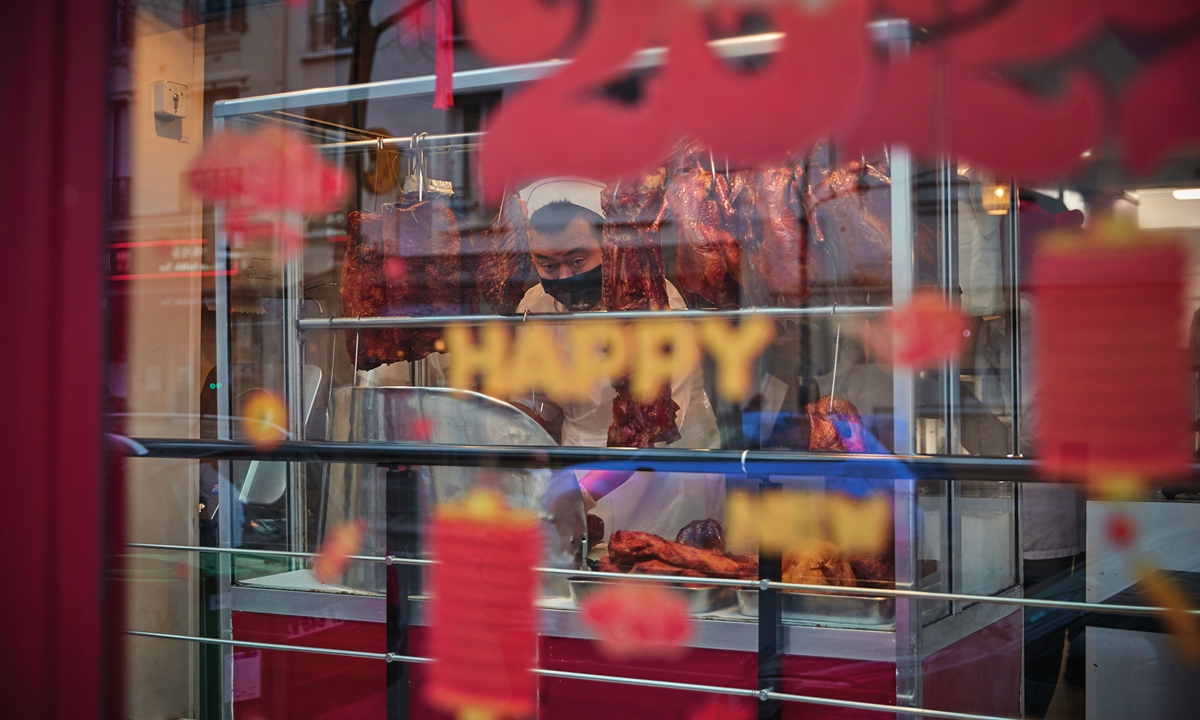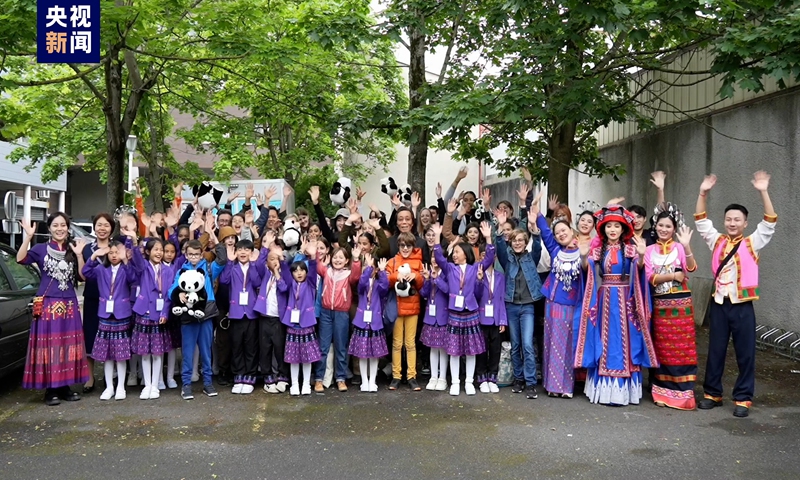
Guo Zhanglong's noodle shop in Paris Photo: Li Jieyi/GT
On a sunny afternoon in May, after days of rain, Guo Zhanglong, or vlogger "Little Guoguo in Paris," took Global Times reporters to his first noodle shop which is not far from the Louvre.
Having been living in Paris more than a decade, Guo's tasty career started quite recently from a food cart at a weekly market. He shared his story in his vlogs and has accumulated numerous followers on multiple platforms. Now he owns two shops, the other is located in a small alley facing Notre Dame Cathedral.
Guo picked the sites in order to attract both local French residents, while also serving the Chinese community and visiting tourists. The strategy has been successful as the customers are roughly half-half. Many French customers are skilled chopstick users and their favorite toppings are tomato, egg and beef.
France has the tradition of having a special of the day and Guo's noodles have now become a usual dish for many of the locals, which has exceeded his expectations and proves that "The French are willing to embrace new things, including different culinary cultures," Guo said.
When Guo arrived in France in 2012 as an overseas student, Paris already had many Chinese restaurants, yet most were "adapted versions, suitable for the locals." However, many "authentic taste" eateries have emerged over the past 10 years.
"Paris has become the ceiling across Europe in terms of Chinese restaurants," Guo joked, as many Chinese students in other countries would come to Paris at the weekend or during the holidays to comfort their Chinese stomach.
Guo saw this "small change in a bite" as the epitome of increasingly vibrant and intensive China-France exchanges over the past decade. Another phenomenon is that more Chinese brands, mainly electronics, rather than "made-in-China" small products, can be seen in this metropolis.
Corentin Delcroix, or Shanghai-based "Chef Guangtan" who is popular on video sites Youtube, Douyin and Bilibili, shared the same feeling on the other side of the story.
After first visiting China in 2002, Guangtan was amazed at the quick development China achieved, in particular, on the internet and digital platforms. Many quality and rare ingredients which used to be difficult to find, can arrive at your door with the click of a button. Many local agricultural products are getting promotion and market recognition.
Yet some Westerners still have a misconception that Chinese food is greasy and cheap, with average materials. Therefore, "I wanted to share more 'genuine Chinese cuisines,' so that they [those Westerners] could learn more about Chinese food, Chinese culture and better understand China's diversity," Guangtan told the Global Times.
Sometimes netizens may follow Chef Guangtan's recipes and share their "homework" - with a picture of a beef bourguignon surrounded by Chinese dishes, and that is Guangtan's "moment of achievement."
Guangtan also said that his counterparts back in France are quite interested in Chinese ingredients and cooking techniques.
Unlike Guangtan, an Institut Paul Bocuse graduate and Michelin-starred chef's fine dining style, Antoine Bunel, a social media influencer based in Beijing, found that the Chinese audience is also receptive to his home-cooking style.
Despite different materials, cooking techniques and a preference to a certain category of food, both China and France have a world renowned culinary heritage, so their conversation often yields passionate exchanges, Bunel told the Global Times.
With an interest in fusion food, Bunel noted such exchanges and fusion have taken place for centuries as the common spice pepper on French tables does not grow in the Mediterranean country, while the Chinese home dish tomato and fried egg was a novelty in 17th century when tomatoes first arrived in the East Asian country.

A chef prepares food in the window of one of the restaurants in La petite Asie (Little Asia), Paris' Chinatown, as the city celebrates Chinese New Year on February 01, 2022 in Paris, France. Photo: VCG
A Chinese girl, Yooupi, stands out from all the vloggers as she gained fame for "cooking based on what is in the dustbin." However, this unique food adventure in France allows her to interact with local French in an untraditional way and gain knowledge of the culture.
"The warmth and kindness they give also encourages me to share my knowledge of China with them," Yooupi told the Global Times.
"Food knows no borders" is the sentence that well represents all the vloggers' experience and feelings.
Guo shared a "magical story" that a local French grandpa received a surprise from a Chinese friend and business partner who he had lost contact for more than 10 years. The grandpa appeared in Guo's video and his Chinese friend happened to come across it. The friend spent a lot of time asking for the French grandpa's number to ask, "I saw you in a video. Was that you?"
Since the noodle shop opened, Guo has hosted many French people who speak Chinese, who have personal connection with or are interested in China, and friends of these friends…Martial arts practitioners, Chinese musical instrument players…
A small noodle shop has become a food-centered salon and Guo suddenly realized that he is building a bridge between the two countries on the two ends of the expansive Eurasia.
Just like a bowl of noodles reunited two old friends, food is one of many possible channels of communication. It is through unremitting exchanges between the two peoples that China and France can form a foundation of public opinion to develop sound relationship, Guo believes.

